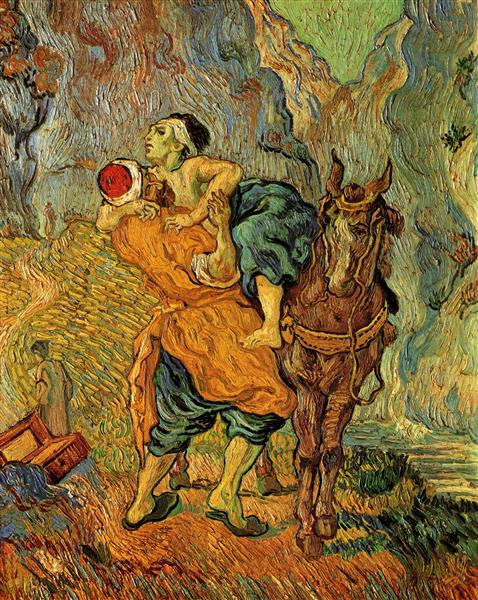
Monday
Luke 10.25-27 “On one occasion an expert in the law stood up to test Jesus. “Teacher,” he asked, “what must I do to inherit eternal life?” “What is written in the Law?” he replied. “How do you read it?” He answered, “‘Love the Lord your God with all your heart and with all your soul and with all your strength and with all your mind’; and, ‘Love your neighbour as yourself.
So a lawyer cross-examines Jesus on the law. Jesus replies with his own questions, and the scribal expert on the law answers exactly and correctly. Before jumping ahead it’s worth weighing that answer. Love God, unequivocally and with all that you are, and love your neighbour as your very own self. That’s a big ask. But a vertical God-directed love that is wholehearted, and a horizontal love directed at those wee meet on the road that is our life – there’s the basis for a life pleasing to God!
Tuesday.
Luke 10.28-29 “You have answered correctly,” Jesus replied, “Do this, and you will live.” But he wanted to justify himself so he asked Jesus, ”And who is my neighbour?”
Trust a lawyer to insist on a clear definition of terminology! As soon as we ask “Who is my neighbour?” we are on the hunt for excuses, exclusions and evasions. Jesus will have none of it. So he tells the story we know as The Good Samaritan. One of the conditions of obedient discipleship is the refusal to reduce the demand of what God requires. Love your neighbour. No ifs and buts, no qualifiers. Just get on with it!
Wednesday
Luke 10.30 “In reply Jesus said: “A man was going down from Jerusalem to Jericho, when he was attacked by robbers. They stripped him of his clothes, beat him and went away, leaving him half dead.”
Bad things happen. None of us are immune to unexpected hardship, whether illness, loss of a job, times of low income and anxiety about how to manage, loneliness and depression. It’s a long list. “Love your neighbour as yourself” is one of those social and personal principles that can make the world safer, life less hard, and can produce in our communities a safety net of kindness and compassion for those who are struggling. In various ways life beats up people. They, in their need, each one, is our neighbour. A follower of Jesus can never ask, “And who is my neighbour?”
Thursday
Luke 10.31-32 “A priest happened to be going down the same road, and when he saw the man, he passed by on the other side. So too, a Levite, when he came to the place and saw him, passed by on the other side.”
“Passed by on the other side.” The person who doesn’t want to get involved. The ‘not my problem’ brigade. We shouldn’t assume this was only about religious scruples. The Law id full of instructions to care for the stranger, show mercy, provide refuge and practical care for those who are suffering. The motives don’t matter. The injured man matters. Levite and priest both saw the man, and walked on. Don’t miss the shock that those words had on the first hearers. If those supposedly closest to God don’t love the neighbour, then nobody else needs to bother either.
Friday
Luke 10.33-34 “But a Samaritan, as he travelled, came where the man was; and when he saw him, he took pity on him. He went to him and bandaged his wounds, pouring on oil and wine. Then he put the man on his own donkey, brought him to an inn and took care of him.”
Follow the verbs – saw him, took pity, went to him, bandaged, poured oil and wine, put him and brought him. This is compassion in action. Verbs are what obedience is about, they are doing words. Love your neighbour as yourself is about what we do!
Saturday
Luke 10.35 “The next day he took out two denarii and gave them to the innkeeper. ‘Look after him,’ he said, ‘and when I return, I will reimburse you for any extra expense you may have.’”
Loving your neighbour is about doing words, including the verb ‘to give’. This isn’t small change which will never be missed. This is signing up to someone else’s need, and honouring the promise. “Love your neighbour as yourself” is miles away from feelings of sympathy, or ‘thoughts and prayers’! In the acts and gifts of agape love, there is an open-endedness that replicates the compassion of Jesus.
Sunday
Luke 10.36-37 “Which of these three do you think was a neighbour to the man who fell into the hands of robbers?” The expert in the law replied, “The one who had mercy on him.” Jesus told him, “Go and do likewise.”
Question answered. Terminology defined. The neighbour is whoever needs our kindness, compassion, practical support. Neighbourliness is a sign of the Kingdom, no need to ask (WWJD) “What would Jesus do?” – you know perfectly well! Just do it!
Leave a Reply